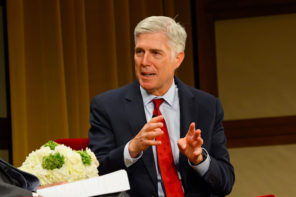Religiously-affiliated government contractors, responding to President Obama’s executive orders barring discrimination by federal government contractors based on sexual orientation and gender identity, believe they may have a claim under the Religious Freedom Restoration Act (RFRA) should they lose, be denied, or be unable to bid on a contract because of their refusal to adhere to the executive orders’ anti-discrimination requirements.
“In the right circumstance, the federal RFRA may be available to challenge the denial of a contract to a religious organization who prefers members of its own religion in employment decisions,” said Erik Stanley, senior legal counsel for Alliance Defending Freedom, the conservative Christian firm that has said it will represent litigants should lawsuits arise. “Even though the EO [executive order] doesn’t provide a cause of action,” Stanley said, “the federal RFRA prevents the government from taking any action that substantially burdens religious exercise.”
The question is whether these contractors, or potential contractors, would prevail on these claims (as Stanley admits “RFRA may be available” and only “in the right circumstance.”)
Notably, while Monday’s executive orders bar discrimination based on sexual orientation and gender identity, Obama maintained an exemption (in a Bush-era executive order) permitting religious organization contractors to hire candidates “of a particular religion.”
Two questions arise as a result: first, whether under Hobby Lobby, these exemptions would become available to closely held, for-profit companies that claim they are religious; and second, whether the permission to hire only co-religionists provides an end-run around the LGBT anti-discrimination provision. In other words, is “co-religionist” hiring broad enough to include refusing to hire a person based on that person being in conflict with your religious beliefs? (More to the point: could a Catholic organization refuse to hire a gay Catholic, claiming that being gay was in conflict with Catholicism?)
Greg Lipper, senior litigation counsel at Americans United for the Separation of Church and State, says that the first question is still open. Under Title VII of the Civil Rights Act, which prohibits discrimination in employment, religiously affiliated organizations do have an exemption which permits them to hire co-religionists, but for-profit companies are not entitled to such an exemption. However, Lipper pointed out, “what the court has potentially done in Hobby Lobby is open RFRA defenses to organizations [for-profit companies] that wouldn’t be entitled to a Title VII exemption but are potentially able to invoke a RFRA claim.”
But the second question—whether the continued executive order religious exemption that permits federal contractors to hire only co-religionists would permit them to hire or fire based on “conduct”—seems less clear.
In their June 25 letter to President Obama pressing for an exemption from the LGBT anti-discrimination executive order, over 100 conservative religious leaders argued that the religious exemption under Title VII did permit them to hire based on a “conduct standard that reflects their religions’ sincerely held beliefs, which include deep convictions about human sexuality.” Fifty legal scholars, in a letter organized by the Public Rights/Private Conscience Project at the Center on Gender & Sexuality Law at Columbia Law School, took issue with that interpretation of Title VII.
“Under current case law,” said Lipper, “it’s probably a stretch to argue that ability to hire co-religionists means you can exclude a class of people [here, LGBT people] based on religion.” The religious exemption under Title VII, he said, does not permit employers “to discriminate on the basis of another protected category,” such as discrimination based on race, but couched in religious terms. Similarly, the co-religionist exemption “does not allow employers to discriminate on the basis of sexual orientation, even if that discrimination in motivated by their religious beliefs,” said Lipper.
While he emphasized he did not think it was likely the litigants would prevail, Lipper said he could imagine a lawsuit similar procedurally to the lawsuits challenging the contraception coverage under the Affordable Care Act, in this case alleging an infringement on religious exercise based on the loss of a contract, the inability to compete for one, or, possibly the requirement that potential contractors pledge to abide by the anti-discrimination order.
It is not clear how the courts would rule on whether this is a “substantial burden” under RFRA. But some legal experts say that even under Hobby Lobby, the executive order is the “least restrictive means” of fulfilling the government’s compelling interest (protecting the rights of LGBT workers).
Kara Loewentheil, Director of Columbia’s Public Rights/Private Conscience Project, said, “Even after Hobby Lobby, we can still say that the courts have not allowed RFRA claims that sacrifice important rights of third parties—the opinion, whether we agree with its reasoning or not, was predicated on the idea that the government could easily and seamlessly accommodate the objectors without causing any gaps in women’s contraceptive coverage, and Justice Kennedy in particular was explicit about that in his concurrence.”
In contrast, “there’s no obvious comparison here for the accommodation in Hobby Lobby—is the government supposed to ensure that if a religious organization that is a federal contractor fires someone for coming out of the closet that person gets a comparable job somewhere else?” Loewentheil said. “There’s no existing accommodation to be utilized that would avoid burdening LGBT rights.”
Experts on both sides agreed there was no case law of which they were aware involving a government contractor bringing a RFRA claim. ADF’s Stanley said that although the executive order itself does not provide a cause of action, the Department of Justice “opined that RFRA could be used in such a circumstance” in its 2007 Office of Legal Counsel memo, and that memo “has never been repealed or modified.”
That memo permits recipients of faith-based grants (as opposed to contracts, which are covered by the executive orders) to seek an exemption from prohibitions on religious discrimination in the statute or program that funds the grant.
But Lipper noted that, regardless of how the reasoning might be applied, the OLC memo, as DOJ opinion, is not binding on the courts. Americans United and other advocacy organizations recently wrote a letter to Attorney General Eric Holder, arguing as well that the reasoning of the memo—that RFRA overrides non-discrimination provisions in statutes such as the Violence Against Women Act and other laws authorizing funding for grantees—is “erroneous and threatens core civil rights and religious liberty protections.”




